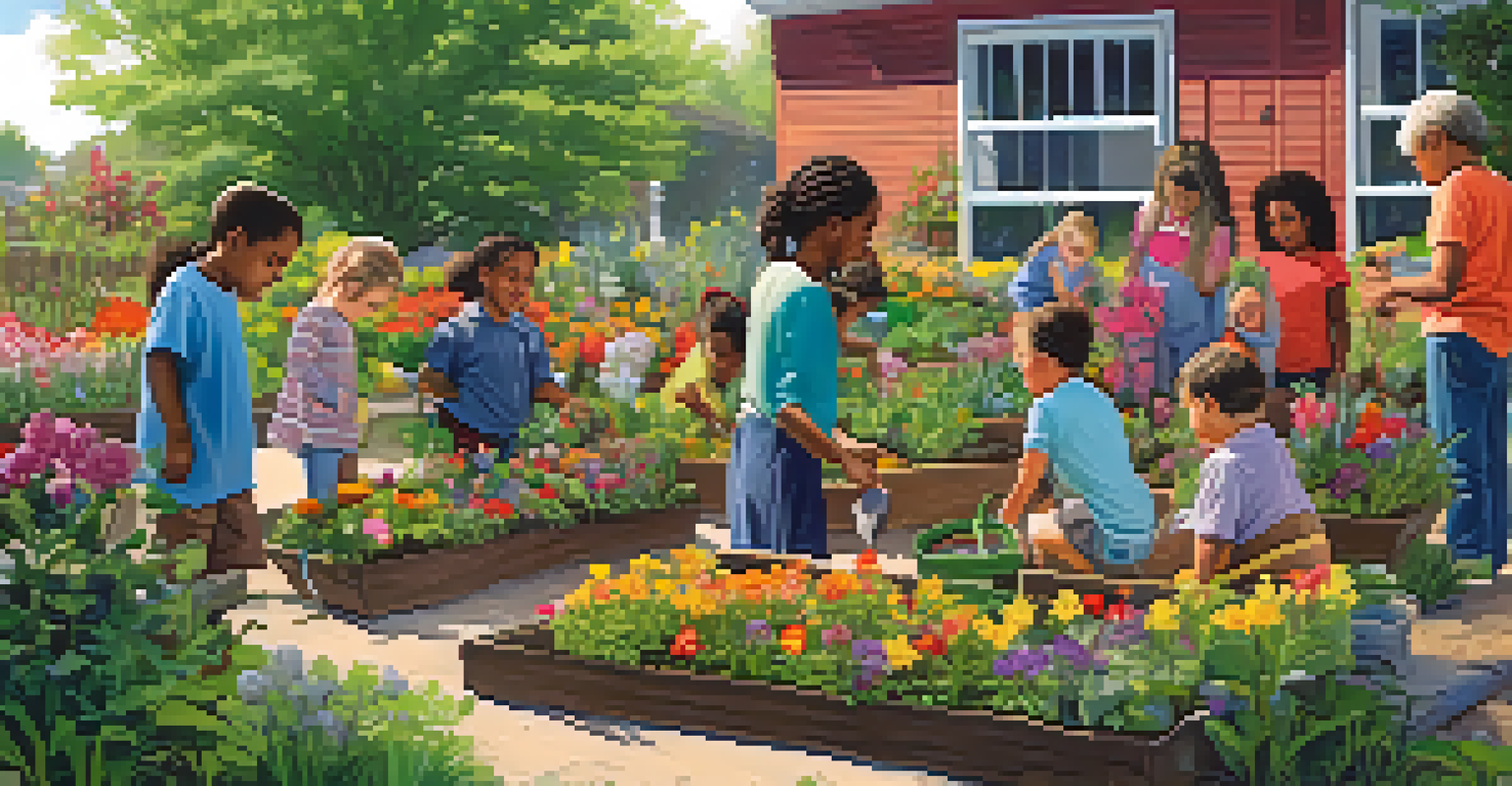Spiritual Practices That Foster Empathy in Personal Relationships

Understanding Empathy: The Heart of Connection
Empathy is the ability to understand and share the feelings of another. It’s not just about feeling sorry for someone; it’s about truly connecting with their experiences. In personal relationships, empathy fosters trust and strengthens bonds, making it a vital component of emotional intimacy.
Empathy is about finding echoes of another person in yourself.
When we practice empathy, we open ourselves up to seeing the world through another's eyes. This perspective shift can transform how we interact with friends and loved ones. Imagine a time when someone listened to you without judgment; that's the power of empathy in action.
By nurturing empathy, we create a safe space where vulnerability flourishes. This not only enhances our relationships but also promotes a deeper sense of community, as empathy encourages us to support one another in our struggles.
Mindfulness: Being Present for Others
Mindfulness is the practice of being fully present in the moment. It allows us to engage with our feelings and those of others without distraction. When we practice mindfulness, we can better tune in to our loved ones’ emotions, which is crucial for developing empathy.

Consider a simple exercise: when conversing with someone, try to focus entirely on them without letting your mind wander. This simple act of presence can dramatically enhance your understanding and connection with the other person.
Empathy Strengthens Connections
Empathy fosters trust and emotional intimacy, allowing us to truly connect with others' experiences.
In relationships, mindfulness helps us to respond thoughtfully rather than react impulsively. By fostering a mindful environment, we encourage open communication and deeper emotional connections.
Meditation: Cultivating Compassion
Meditation is a powerful tool for fostering compassion and empathy. By taking time to meditate, we can quiet our minds and reflect on our emotions and those of others. This practice not only enhances self-awareness but also deepens our understanding of others’ experiences.
The best way to find yourself is to lose yourself in the service of others.
One effective meditation technique is loving-kindness meditation, where you focus on sending love and compassion to yourself and others. This practice expands your capacity for empathy as you visualize the well-being of loved ones and even those you may struggle with.
Through regular meditation, we can break down barriers that prevent us from connecting with others. This openness allows our relationships to flourish as we learn to embrace differences and approach conflicts with compassion.
Journaling: Reflecting on Emotions
Journaling is an excellent way to explore our thoughts and feelings, especially in relation to others. Writing about our experiences can help us process emotions and gain insights into our relationships. This act of reflection encourages us to consider how our actions affect those around us.
By keeping a gratitude journal, for instance, we can focus on the positive aspects of our relationships. Reflecting on what we appreciate about others can enhance our empathy and deepen our connections.
Mindfulness Enhances Listening Skills
Practicing mindfulness helps us engage fully with others, improving our understanding and emotional connections.
Additionally, journaling can help us articulate our feelings better. When we understand our emotions, we can communicate them more effectively, which is crucial for fostering empathy.
Active Listening: The Art of Being Heard
Active listening is a skill that can dramatically improve our relationships. It involves fully concentrating on what the other person is saying without interrupting or formulating a response while they speak. This practice shows that we value their thoughts and feelings, which is essential for empathy.
When we listen actively, we encourage openness and honesty. It’s like holding up a mirror for the other person, allowing them to see and express their feelings fully. This not only builds trust but also deepens emotional connections.
To practice active listening, try summarizing what the other person has said to confirm your understanding. This technique reinforces that you are truly engaged and care about their perspective.
Acts of Kindness: Walking in Someone Else's Shoes
Engaging in acts of kindness can significantly enhance our capacity for empathy. Simple gestures, like offering help or expressing appreciation, remind us of the positive impact we can have on others’ lives. These actions not only uplift others but also strengthen our emotional bonds.
Consider volunteering for a cause that resonates with you. This experience can expose you to diverse perspectives and deepen your understanding of others' struggles. By stepping into someone else’s shoes, you cultivate a natural sense of empathy.
Acts of Kindness Foster Community
Engaging in acts of kindness not only uplifts others but also cultivates a compassionate environment where empathy thrives.
Moreover, these acts of kindness encourage a ripple effect; the more kindness we share, the more likely others are to reciprocate. This cycle fosters a compassionate community where empathy thrives.
Forgiveness: Releasing Emotional Burdens
Forgiveness is a powerful spiritual practice that can free us from emotional burdens. Holding onto grudges can cloud our ability to empathize with others, as resentment often creates barriers to connection. By forgiving, we allow ourselves to move forward and open our hearts to others.
Imagine the weight that lifts off your shoulders when you choose to forgive someone. This act not only benefits you but also creates space for understanding and compassion in your relationships. It’s a step towards healing and reconnecting.

Additionally, practicing self-forgiveness is equally important. When we learn to forgive ourselves, we become more empathetic towards others’ mistakes, fostering deeper connections based on understanding and acceptance.
Connecting with Nature: Finding Shared Ground
Spending time in nature can profoundly impact our emotional well-being and empathy. Nature encourages reflection and connection, allowing us to appreciate the beauty of life and our shared experiences. This connection can foster a sense of unity with others.
Consider taking a walk in a park or hiking through the woods. These experiences can provide clarity and help us see the bigger picture in our relationships. Nature often reminds us that we are part of something greater, which can enhance our empathy for others.
Furthermore, engaging in group activities in nature, like community gardening or outdoor yoga, can strengthen bonds among participants. These shared experiences create opportunities for connection, empathy, and understanding.